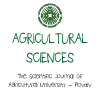Plant physiology
Plant physiology (PP) is a discipline dedicated to studying the vital activity of plant organisms during their ontogenesis and under different environmental conditions. The subject of PP are plants, their organs, cells and organelles as well as protoplast, cell and tissue cultures. In the course of PP students are introduced to the physiological processes and functions in plants, the mechanisms of their regulation, their dependence on external and internal factors, etc. The main subdivisions of the course are: physiology of the plant cell, water exchange in plants, photosynthesis, respiration, mineral nutrition, growth and development, tolerance to stress. PP requires input knowledge from other biological disciplines, namely Botany, Biochemistry and Biophysics and provides output for all other plant breeding and ecological courses.
Plant physiology, together with other fundamental sciences, creates a strong theoretical base in the students to increase the biological and economical productivity of crops. The obtained knowledge has also a practical aspect in relation to evaluation of the vital status of plant organisms under different ecological conditions and agrotechnical activities. Disciplines following PP, in which the acquired skills are further improved, include Plant Physiological Ecology, Postharvest Physiology, Non-infectious Diseases and others.
 - Events on the occasion of the 75th anniversary of AU
- Events on the occasion of the 75th anniversary of AU










